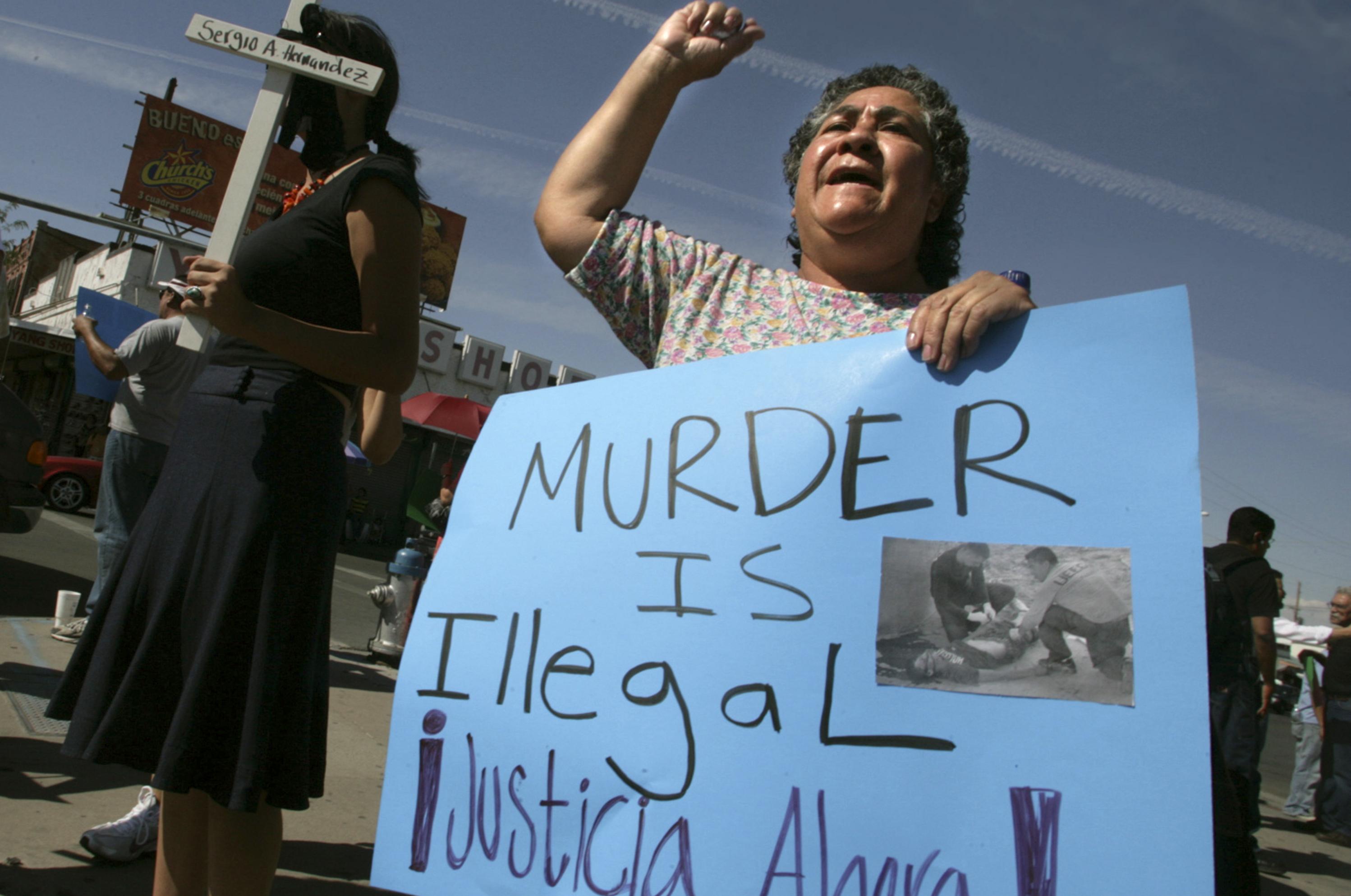“The court made clear that the Constitution does not stop at the border, and that agents should not have constitutional immunity to fatally shoot Mexican teenagers on the other side of the border fence”
by Kevin Gosztola
The Ninth Circuit Court of Appeals ruled a United States Border Patrol agent did not have “qualified immunity” and could be sued for violating the Fourth Amendment, when he shot across the border and killed a boy in Mexico.
“The court made clear that the Constitution does not stop at the border, and that agents should not have constitutional immunity to fatally shoot Mexican teenagers on the other side of the border fence,” declared Lee Gelernt, the deputy director of the American Civil Liberties Union’s Immigrants’ Rights Project. “The ruling could not have come at a more important time, when this administration is seeking to further militarize the border.”
The ACLU was among attorneys that brought the suit on behalf of the family of José Antonio Elena Rodríguez. The 16-year-old boy was killed on Oct. 10, 2012, in Nogales, Mexico, while walking on a street that “runs parallel to the border.”
According to the allegations against Border Patrol Officer Lonnie Swartz, Rodriguez fired at least 14 bullets across the border. The boy was hit by about 10 bullets.
Rodriguez “was not committing a crime. He did not throw rocks or engage in any violence or threatening behavior against anyone or anything, and he did not otherwise pose a threat to Swartz or anyone else. He was just walking down a street in Mexico.”
The boy was on Calle Internacional, which the decision [PDF] describes as a “main thoroughfare lined with commercial and residential buildings.”
“The American side of the border is on high ground, atop a cliff or rock wall that rises from the level of Calle Internacional. The ground on the American side is around 25 feet higher than the road, and a border fence rises another 20 or 25 feet above that.”
As the decision notes, “Nogales, Mexico, and Nogales, Arizona, are in some respects one town divided by the border fence. Families live on both sides of the border, and people go from one side to the other to visit and shop.”
The boy’s grandparents live in Arizona, and his grandmother would often stay with him when his mother was at work.
“Based on the facts alleged in the complaint, Swartz violated the Fourth Amendment. It is inconceivable that any reasonable officer could have thought that he or she should kill [Rodriguez] for no reason,” the appeals court states.
The appeals court maintains Swartz could not argue the Fourth Amendment did not apply because Rodriguez was a Mexican citizen on Mexican soil. “[Swartz] acted on American soil subject to American law.”
“Applying the Constitution in this case would simply say that American officers must not shoot innocent non-threatening people for no reason,” the appeals court adds. “Enforcing that rule would not unduly restrict what the United States could do either here or abroad. So under the particular circumstances of this case, [Rodriguez] had a Fourth Amendment right to be free from the objectively unreasonable use of deadly force by an American agent acting on American soil.”
Swartz did not know whether the boy was a U.S. citizen or not. “Thus, Swartz is not entitled to qualified immunity on the bizarre ground that [Rodriguez] was not an American.”
Additionally, the appeals court addresses a federal district court’s dismissal of the family’s Fifth Amendment claim. The district court dismissed the Fifth Amendment claim because it found the Fourth Amendment applied.
“If the Fourth Amendment does not apply because [Rodríguez] was in Mexico, then the Fifth Amendment “shocks the conscience” test may still apply. Swartz’s conduct would fail that test.”
“We cannot imagine anyone whose conscience would not be shocked by the cold-blooded murder of an innocent person walking down the street in Mexico or Canada by a U.S. Border Patrol agent on the American side of the border.”
The U.S. government attempted to have the lawsuit dismissed by arguing that allowing Rodriguez’s family to seek damages because the “cross-border nature of the shooting implicates foreign policy.” Yet, the government never specified what policy was implicated.
All the U.S. government could come up with to support this argument is that both the U.S. and Mexican governments have a bilateral council to “address border violence, use of force, and ways to address and mitigate incidents of border violence.” Though, especially under President Donald Trump, it’s ridiculous to suggest that any of those meetings would focus on the violence of U.S. Border Patrol agents.
“Just as national security cannot be used as a talisman to ward off inconvenient claims, neither does the ‘mere incantation’ of the magic words ‘foreign policy’” cause a remedy for unconstitutional conduct to disappear.
In other immigration related news:
Worker accused of sexually abusing eight minors in immigrant shelter
According to ProPublica, a youth caregiver employed by Southwest Key was charged with eleven offenses after authorities accused him of sexual abuse of at least eight unaccompanied immigrant children for almost a year in one of the shelters of the company in Mesa, Arizona, according to the federal court records.
The allegations against Levian D. Pacheco, who is HIV positive, include that he subjected two of the adolescents to oral sex and tried to force himself on one of them to penetrate his anus. The other six adolescents, between 15 and 17 years old, said that Pacheco had handcuffed them on their clothes. According to the petition filed with the court to establish the prosecution case, it is alleged that all incidents occurred between August 2016 and July 2017.



